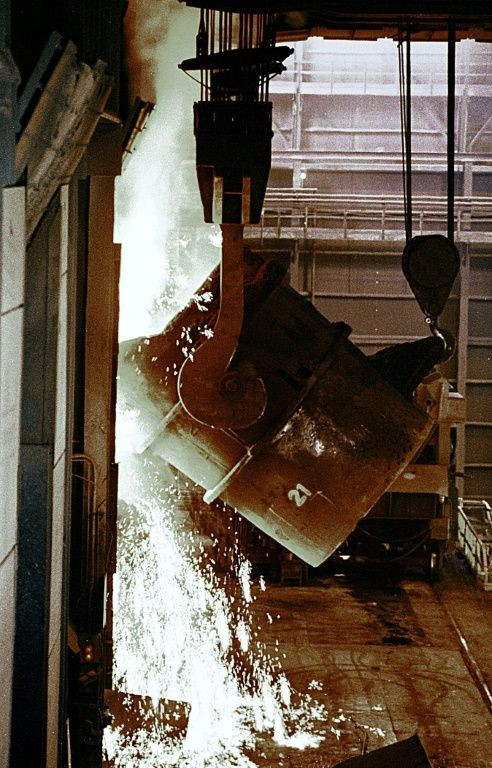US Re-imposes Steel, Aluminum Tariffs On Brazil, Argentina

US President Donald Trump on Monday announced plans to reimpose tariffs on steel and aluminum from Brazil and Argentina, hitting back at what he called their "unfair" policies.
The move appeared to surprise his Brazilian counterpart, Jair Bolsonaro, who considers himself an ideological ally of the Republican leader. Industry leaders in both countries cried foul.
"Brazil and Argentina have been presiding over a massive devaluation of their currencies," which is hurting American farmers, Trump said on Twitter.
"Effective immediately, I will restore the Tariffs on all Steel & Aluminum that is shipped into the US from those countries."
Trump last year announced global tariffs of 25 percent on steel and 10 percent on aluminum but later approved exemptions for some countries, including Argentina and Brazil -- after they agreed to quotas.
Bolsonaro sought to play down the issue, saying he would appeal to Trump for more understanding of Brazil's position and boasting he has an "open channel" with the US leader if needed.
Later, in a radio interview, Bolsonaro said: "I hope he understands and doesn't penalize us in this matter."
The Brazilian leader added he was confident he would receive a favorable hearing from the US president.
"I am almost convinced that he will hear us," he said.
For its part, Argentina's labor and production ministry said in a statement that it had asked the US for clarification about the announcement and was looking into possible "joint action" with Brazil in response.
Brazil's Steel Institute said it was perplexed by Trump's decision.
"There is no initiative by the government to artificially devalue the Real, and the decision to tax Brazilian steel as a way to compensate American farmers is a retaliation against Brazil, which is inconsistent with the partnership relationship between the two countries," it said.
The decision "ends up hurting the American steelmaking industry itself, which needs semi-finished products exported by Brazil in order to operate its mills," the institute added.
Brazil is the second-largest supplier of steel to the US market behind Canada.
And Brazil and Argentina have benefitted from the US trade war with China, as they have stepped in to replace American exports of soybeans and other agricultural goods to the Asian giant.
Bolsonaro earlier this month met with China's President Xi Jinping in Brasilia and said the world's second-largest economy was "becoming more and more part of Brazil's future."
Speaking to reporters on the White House lawn before departing for the NATO summit in London, Trump said Brazil had "devalued their currency very substantially by 10 percent."

He said he had given Argentina "a big break" on tariffs, "but now I'm taking that break off. Because it is very unfair to our manufacturers and very unfair to our farmers."
"Our steel companies will be very happy and our farmers will be very happy with what I did," Trump added.
Brazil has teetered on the brink of recession this year, and Argentina is again enmeshed in an economic crisis, which has led to the currencies of both countries weakening against the US dollar.
A weaker currency tends to make exports more competitive, while a stronger US dollar makes foreign goods cheaper for American consumers.
But as the global economy slows, the US dollar tends to strengthen as it becomes a safe haven for nervous investors around the world.
Jose Urtubey, spokesman for Argentina's powerful UIA industrial lobby, said producers in the country will be harmed immediately by the tariffs.
With Argentina's "lack of competitiveness" as a producer, the fact that the United States had the lowest steel and aluminum tariffs was "beneficial," Urtubey said.
The head of Argentina's only aluminum producer, Javier Mandanes Quintanilla of the Aluar Group, viewed the tariff plan with trepidation.
"This is a measure that affects us very strongly," he told La Nacion.
The US imported nearly 169,000 tons of steel from Argentina last year, representing more than $220 million in trade.
Bolsonaro's right-wing government has promised to revive Brazil's flagging economy with a massive stimulus plan, as well as pension and tax reforms, and the central bank has cut the key interest rate more than a dozen times since late 2016.
Trump views those moves as an effort to gain at the expense of the United States.
In his tweets, Trump also called on the Federal Reserve to "likewise act" so other nations no longer "take advantage of our strong dollar by further devaluing their currencies."
Amid a slowing global economy and the impact of Trump's wide ranging trade offensive, mostly directed against China, the Fed has cut the benchmark interest rates three times this year.
But it has signaled it will stand back before deciding on any further moves.
Despite widespread complaints about the impact of the tariffs on US businesses and consumers, as well as the hit to farmers who have been the target of retaliation from trading partners, Trump claimed in his tweet on Monday that Washington has taken in "massive amounts of money" from the tariffs.
American steel has continued to suffer, with overall employment edging downward and production halted at blast furnaces last month.
© Copyright AFP {{Year}}. All rights reserved.





















